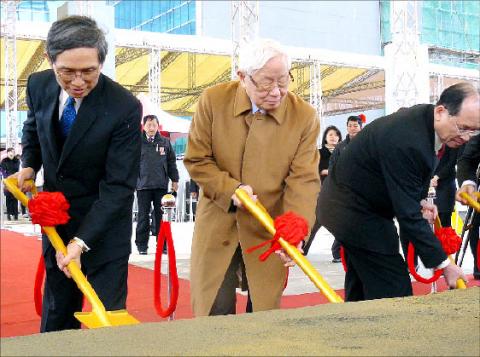Taiwan Semiconductor Manufacturing Co (TSMC, 台積電), the world’s top contract chipmaker, yesterday broke ground for a new advanced factory, aimed at fueling future revenue growth by widening its leadership in technology and capacity.
TSMC expects the new factory, phase three of TSMC’s NT$300 billion (US$9.92 billion) mega factory, dubbed Fab 15, to generate as much as US$3 billion in revenue a year once it enters volume production. TSMC said it planned to produce chips using 20-nanometer process technology, or more advanced technology, at the factory.
The chipmaker said it expected the phase-one factory to mass--produce 28-nanometer chips in the first quarter of next year, about one-and-half years after it began construction in July last year.

Photo: CNA
The company’s phase three expansion plan comes at a time when global economic weakness has taken its toll on the global semiconductor industry.
This year, the chip industry will see revenue grow by just 1 percent annually, TSMC chairman and chief executive Morris Chang (張忠謀) forecast in October.
However, Chang said yesterday this year’s downturn would not be as severe as in 2008-2009.
“The situation is not bad in terms of revenue and profitability. The fourth quarter will not be far from the third quarter,” he said.
The company projected in October its revenues would fall 3.27 percent at the most, to NT$103 billion this quarter, down from NT$106.48 billion last quarter.
Chang also said yesterday he had high hopes for the mobile sector and that he was excited about the company’s market share gain in chips for smartphones and tablets because they were the areas with strong growth.
Every smartphone sold contributed more than US$7 to TSMC’s revenues and tablets contributed another US$7 per unit sold, he said.
After between 40 and 50 percent annual growth over the past two years, smartphone revenues were expected to grow by about 30 percent next year from this year, which was still high, Chang said, citing TSMC’s internal forecast.
The company makes chips for Broadcomm Inc and Qualcomm Inc, which supply chips to handset makers including Apple Inc, HTC Corp (宏達電) and Nokia Oyj.
TSMC has also started supplying a small volume of chips using a new 28-nanometer packaging technology to Xilinx Inc, a reliable source said.
TSMC did not expect substantial revenue contributions from the new packaging service before 2015, Chang said.
Separately, TSMC yesterday reported revenues of NT$35.86 billion for last month, down 4.7 percent from NT$37.61 billion in October. On an annual basis, it represented a 2.7 percent decrease from NT$36.85 billion last year.
“This result is slightly above our expectation for an 8 percent decrease from the high October base, and above historical post-bubble seasonality of falling 6.9 percent month-on-month for the same period,” Credit Suisse semiconductor analyst Randy Abrams said in a report yesterday.
Abrams attributed early Lunar New Year restocking demand and increasing smartphone demand in China to the slightly better-than--expected revenues for last month.
TSMC is likely to achieve the top end of its revenue guidance of NT$105 billion for the current quarter, he said.

The Eurovision Song Contest has seen a surge in punter interest at the bookmakers, becoming a major betting event, experts said ahead of last night’s giant glamfest in Basel. “Eurovision has quietly become one of the biggest betting events of the year,” said Tomi Huttunen, senior manager of the Online Computer Finland (OCS) betting and casino platform. Betting sites have long been used to gauge which way voters might be leaning ahead of the world’s biggest televised live music event. However, bookmakers highlight a huge increase in engagement in recent years — and this year in particular. “We’ve already passed 2023’s total activity and

Nvidia Corp CEO Jensen Huang (黃仁勳) today announced that his company has selected "Beitou Shilin" in Taipei for its new Taiwan office, called Nvidia Constellation, putting an end to months of speculation. Industry sources have said that the tech giant has been eyeing the Beitou Shilin Science Park as the site of its new overseas headquarters, and speculated that the new headquarters would be built on two plots of land designated as "T17" and "T18," which span 3.89 hectares in the park. "I think it's time for us to reveal one of the largest products we've ever built," Huang said near the

China yesterday announced anti-dumping duties as high as 74.9 percent on imports of polyoxymethylene (POM) copolymers, a type of engineering plastic, from Taiwan, the US, the EU and Japan. The Chinese Ministry of Commerce’s findings conclude a probe launched in May last year, shortly after the US sharply increased tariffs on Chinese electric vehicles, computer chips and other imports. POM copolymers can partially replace metals such as copper and zinc, and have various applications, including in auto parts, electronics and medical equipment, the Chinese ministry has said. In January, it said initial investigations had determined that dumping was taking place, and implemented preliminary

Intel Corp yesterday reinforced its determination to strengthen its partnerships with Taiwan’s ecosystem partners including original-electronic-manufacturing (OEM) companies such as Hon Hai Precision Industry Co (鴻海精密) and chipmaker United Microelectronics Corp (UMC, 聯電). “Tonight marks a new beginning. We renew our new partnership with Taiwan ecosystem,” Intel new chief executive officer Tan Lip-bu (陳立武) said at a dinner with representatives from the company’s local partners, celebrating the 40th anniversary of the US chip giant’s presence in Taiwan. Tan took the reins at Intel six weeks ago aiming to reform the chipmaker and revive its past glory. This is the first time Tan